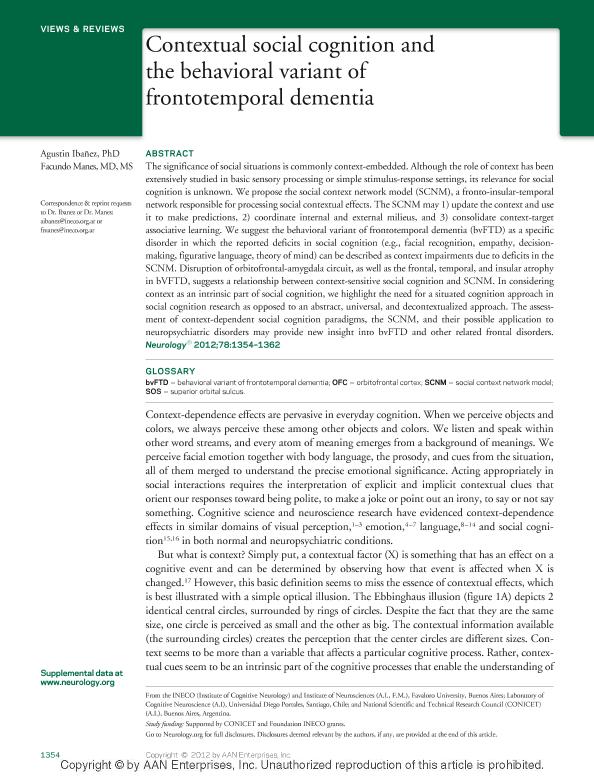Mostrar el registro sencillo del ítem
dc.contributor.author
Ibañez, Agustin Mariano

dc.contributor.author
Manes, Facundo Francisco

dc.date.available
2023-03-10T10:26:27Z
dc.date.issued
2012-06
dc.identifier.citation
Ibañez, Agustin Mariano; Manes, Facundo Francisco; Contextual social cognition and the behavioral variant of frontotemporal dementia; Lippincott Williams; Neurology; 78; 17; 6-2012; 1354-1362
dc.identifier.issn
0028-3878
dc.identifier.uri
http://hdl.handle.net/11336/190145
dc.description.abstract
The significance of social situations is commonly context-embedded. Although the role of context has been extensively studied in basic sensory processing or simple stimulus-response settings, its relevance for social cognition is unknown. We propose the social context network model (SCNM), a fronto-insular-temporal network responsible for processing social contextual effects. The SCNM may 1) update the context and use it to make predictions, 2) coordinate internal and external milieus, and 3) consolidate context-target associative learning. We suggest the behavioral variant of frontotemporal dementia (bvFTD) as a specific disorder in which the reported deficits in social cognition (e.g., facial recognition, empathy, decisionmaking, figurative language, theory of mind) can be described as context impairments due to deficits in the SCNM. Disruption of orbitofrontal-amygdala circuit, as well as the frontal, temporal, and insular atrophy in bVFTD, suggests a relationship between context-sensitive social cognition and SCNM. In considering context as an intrinsic part of social cognition, we highlight the need for a situated cognition approach in social cognition research as opposed to an abstract, universal, and decontextualized approach. The assessment of context-dependent social cognition paradigms, the SCNM, and their possible application to neuropsychiatric disorders may provide new insight into bvFTD and other related frontal disorders.
dc.format
application/pdf
dc.language.iso
eng
dc.publisher
Lippincott Williams

dc.rights
info:eu-repo/semantics/openAccess
dc.rights.uri
https://creativecommons.org/licenses/by-nc-sa/2.5/ar/
dc.subject
CONTEXTUAL SOCIAL COGNITION
dc.subject
FRONTOTEMPORAL DEMENTIA
dc.subject
BEHAVIORAL VARIANT
dc.subject.classification
Neurología Clínica

dc.subject.classification
Medicina Clínica

dc.subject.classification
CIENCIAS MÉDICAS Y DE LA SALUD

dc.title
Contextual social cognition and the behavioral variant of frontotemporal dementia
dc.type
info:eu-repo/semantics/article
dc.type
info:ar-repo/semantics/artículo
dc.type
info:eu-repo/semantics/publishedVersion
dc.date.updated
2023-03-05T15:34:10Z
dc.journal.volume
78
dc.journal.number
17
dc.journal.pagination
1354-1362
dc.journal.pais
Estados Unidos

dc.journal.ciudad
Philadelphia
dc.description.fil
Fil: Ibañez, Agustin Mariano. Consejo Nacional de Investigaciones Científicas y Técnicas; Argentina
dc.description.fil
Fil: Manes, Facundo Francisco. Consejo Nacional de Investigaciones Científicas y Técnicas; Argentina
dc.journal.title
Neurology

dc.relation.alternativeid
info:eu-repo/semantics/altIdentifier/url/https://n.neurology.org/content/78/17/1354
dc.relation.alternativeid
info:eu-repo/semantics/altIdentifier/doi/http://dx.doi.org/10.1212/WNL.0b013e3182518375
Archivos asociados
